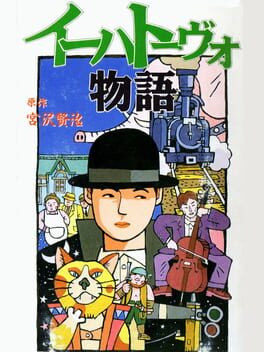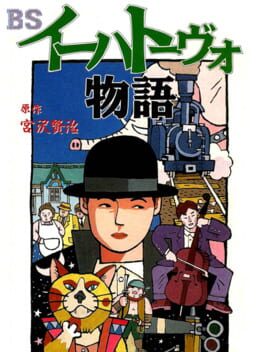

The story depicts the action as taking place in the utopian world of Ihatovo. The game focuses on collecting information (notebooks from Miyazawa's fairy tales) and items (that are related to those fairy tales) instead of fighting monsters. Some of the surprises that the player finds includes a movie theater that is always closed, the opportunity to play the role of a temporary school teacher, and having portraits of unique non-player characters that show up while talking to them. Inspired by the stories of Kenji Miyazawa, the story covers nine chapters and surreal environments.
Also in series
Reviews View More
A really, really interesting game that requires a bit of patience and openness to its motions, which ultimately pays off.
I was not familiarized with the works of Kenji Miyazawa and played the first two thirds of the game simply enjoying it as an experimental somewhat surreal project for the Super Famicom. Learning it is actually a love letter to the works of an influential Japanese poet and also an attempt to translate his sensibility into an interactive art form made it even more special.
Gameplay-wise, Ihatovo Monogatari (Stories of Ihatovo) is pretty simple, consisting on multiple, self-contained small chapters loosely focused on one of Miyazawa's stories each, while keeping a really charming sense of passage of time. You will be mostly likely trying to figure out how to advance the plot speaking with the right characters and giving them the correct items. It may feel a bit too simple and slow-paced to our time, but even going beyond the necessary good faith required to enjoy an experimental game from thirty years ago and its obvious limitations, I think this is a very smart, confident project on its own merits. Its sluggish, meditative pace fits the meditative nature of most good poetry. Most of all, though, it made me yearn for a game with its passion for the tiny stories of tiny, weird places but applying mechanics and lessons learned decades later, maybe in an Outer Wilds-like approach of knowledge as a verb that moves forward the greater machinery.
In any case, Ihatovo Monogatari is a must-play to anyone who is interested in weird stories from the early days of video games. It's not for everybody - thankfully!
I was not familiarized with the works of Kenji Miyazawa and played the first two thirds of the game simply enjoying it as an experimental somewhat surreal project for the Super Famicom. Learning it is actually a love letter to the works of an influential Japanese poet and also an attempt to translate his sensibility into an interactive art form made it even more special.
Gameplay-wise, Ihatovo Monogatari (Stories of Ihatovo) is pretty simple, consisting on multiple, self-contained small chapters loosely focused on one of Miyazawa's stories each, while keeping a really charming sense of passage of time. You will be mostly likely trying to figure out how to advance the plot speaking with the right characters and giving them the correct items. It may feel a bit too simple and slow-paced to our time, but even going beyond the necessary good faith required to enjoy an experimental game from thirty years ago and its obvious limitations, I think this is a very smart, confident project on its own merits. Its sluggish, meditative pace fits the meditative nature of most good poetry. Most of all, though, it made me yearn for a game with its passion for the tiny stories of tiny, weird places but applying mechanics and lessons learned decades later, maybe in an Outer Wilds-like approach of knowledge as a verb that moves forward the greater machinery.
In any case, Ihatovo Monogatari is a must-play to anyone who is interested in weird stories from the early days of video games. It's not for everybody - thankfully!
This review contains spoilers
This is basically a walking sim for the Super Famicom, but I love the calm atmosphere and the overall ~vibes~ of the game. I was a little annoyed at some parts (the game doesn’t make it super obvious when you need to talk to someone more than one time in a row), but it wasn’t enough to dissuade me from finishing the game. I loved the end of the story where the main character follows Miyazawa on the Galactic Railroad. I actually ended up buying a collection of short stories by Miyazawa after completing the game as well.
I wanted to give this game a higher score than I ended up at, but I just don’t think that it works very well as a video game. It’s definitely a beautiful experience. The calm, almost somber soundtrack, the interplay between mundane city life and fantastical little fables, the surprisingly dark places that the stories go, all come together into something unlike any other SNES/SFC game I’ve played.
The problem is that the player’s involvement in this world and these stories is minimal. This makes sense considering they’re adaptations of Kenji Hayazawa’s actual stories, but the result is that the game often struggles to find something to actually give the player to do. It gave me the same feeling that I got while playing through some of the less interesting Disney worlds in Kingdom Hearts games, the ones where Sora and co. just watch a Disney movie and occasionally do something very tangentially related to the plot.
I don’t really know what could have been done to alleviate this problem. It really just kind of feels like a video game isn’t a good medium for experiencing these stories. All that being said, I still enjoyed my time with the game and I’m glad to have been introduced to Miyazawa’s works. I’ve picked up a collection of his stories to read, and I can’t wait to dig into them.
The problem is that the player’s involvement in this world and these stories is minimal. This makes sense considering they’re adaptations of Kenji Hayazawa’s actual stories, but the result is that the game often struggles to find something to actually give the player to do. It gave me the same feeling that I got while playing through some of the less interesting Disney worlds in Kingdom Hearts games, the ones where Sora and co. just watch a Disney movie and occasionally do something very tangentially related to the plot.
I don’t really know what could have been done to alleviate this problem. It really just kind of feels like a video game isn’t a good medium for experiencing these stories. All that being said, I still enjoyed my time with the game and I’m glad to have been introduced to Miyazawa’s works. I’ve picked up a collection of his stories to read, and I can’t wait to dig into them.

